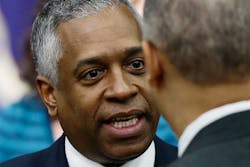ATF Nominee Faces Obstacles to Confirmation
WASHINGTON -- The Senate Judiciary Committee voted Thursday to approve B. Todd Jones as director of the ATF, but questions about his management style coupled with opposition by the powerful gun lobby could endanger his chances to clear the full Senate next week.
Those obstacles surfaced during committee debate. The panel approved him on a strict party-line vote of 10 to 8, and the panel's leading Republican, Sen. Charles E. Grassley of Iowa, said two ongoing investigations into Jones' tenure as the U.S. attorney in Minnesota needed further review before he should be considered competent to run the federal Bureau of Alcohol, Tobacco, Firearms and Explosives.
"There is an open investigation on serious allegations of whistle-blower retaliation," Grassley said. "We don't know the result of those investigations. The committee doesn't have the full information about the nominee. These are serious allegations."
He added, "I do not believe we should rubber-stamp this nominee and sweep these allegations under the rug."
But the committee chairman, Sen. Patrick J. Leahy (D-Vt.), said Republicans were simply bowing to gun rights supporters, whose lobbying has helped keep the post vacant for seven years. "There are some on your side who don't want any director, no matter who it is," Leahy said, turning to Grassley. "I think no matter who we have you're going to have a complaint."
Sen. Dianne Feinstein (D-Calif.) said the fight over the ATF directorship was no different from that over a proposed ban on some assault weapons, which the National Rifle Assn. and other gun groups have successfully opposed.
"There has been a concerted effort to weaken the bureau," she said of the ATF and its agents. "This is accomplished by keeping it as weak as possible. Bit by bit they become more timid and more reclusive, and that is the goal for some. It is wrong. It's gone on year after year now, and it's got to stop."
Sen. Amy Klobuchar (D-Minn.) praised Jones for his work as the ATF's acting director, noting that President Obama brought him in to help revamp the agency after its notorious Fast and Furious gun-tracking debacle, during which hundreds of weapons vanished and many wound up at crime scenes -- including the site in Arizona where a U.S. Border Patrol agent was slain.
But the larger issue, she said, is that "something is wrong when the Senate fails to confirm the head of an agency for seven years. I am concerned that we couldn't confirm anyone for this position if we can't confirm Mr. Jones."
Grassley responded, "You might say some Republicans don't want a director, but don't put me into that category."
He said his concern was that the committee should wait until investigations were completed into complaints about Jones from Minnesota. Those allegations deal with "abuse of authority and gross mismanagement," Grassley said, and noted that at a confirmation hearing last month Jones declined to discuss them, citing privacy reasons.
Employees in the Minnesota U.S. attorney's office, including an assistant prosecutor and others, have complained that Jones has a "militarist" management style and that he created a "climate of fear." In addition, Donald Oswald, the former special agent in charge of the FBI office in Minneapolis, accused Jones of "poor leadership."
Jones also allegedly retaliated against those who complained, suspending them or giving them poor performance evaluations. As acting director of the ATF, he was further criticized for making a video warning agents not to go outside the chain of command with internal complaints.
The ATF for years was part of the Treasury Department, but in 2006 it was moved to the Justice Department as part of a post-Sept. 11 realignment of federal law enforcement functions. Since then, the NRA and other gun groups have objected to every nominee to run the agency put forward by the George W. Bush and Obama administrations.
Over the next few days, the NRA and other gun groups are expected to gear up their campaign to get senators to vote against Jones. Even though there is a Democratic majority in the Senate, Republicans can move to postpone or block a vote. And in order to overcome a GOP filibuster, Democrats would need a minimum of six Republican cross-over votes when the confirmation comes to the floor of the full Senate.
After Thursday's committee vote, Feinstein said, "Next week we're going to have a real donnybrook in this place."
Copyright 2013 - Los Angeles Times
McClatchy-Tribune News Service
